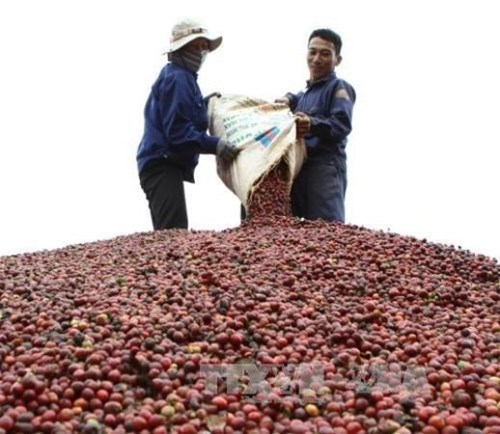Export revenue of the domestic economic sector rose 31.6 percent while that of the foreign direct investment (FDI) sector expanded by 33.7 percent.
Items posting year-on-year increases in export value included phones and spare parts; garments-textile; electronic products, computers and spare parts; footwear; machines; equipment and tools; wood and timber products; vehicles and spare parts; coffee; and fruit and vegetables.
However, export revenue of rubber and pepper dropped by 5.7 percent and 17.9 percent, respectively during the month.
China was Vietnam’s largest export market with a turnover of USD 4.5 billion, a 2.5-fold rise from the corresponding time last year, followed by the US, the EU, the Association of Southeast Asian Nations (ASEAN), Japan and the Republic of Korea.
    |
 |
|
Coffee exports increases by 7.7 percent year-on-year to USD 340 million. |
Meanwhile, the country imported USD 19.3 billion worth of goods in January, down 3 percent against December 2017 but up 47.4 percent year-on-year. The import value of the domestic economic sector increased by 43.2 percent and the FDI sector jumped 50.4 percent.
Among the import items, phones and spare parts; electronic products, computers and spare parts; machines, equipment and tools; and oil and gas saw higher import values.
On the contrary, import revenue of autos, milk and dairy products fell 17.9 percent and 6.2 percent, respectively.
China remained the largest import market of Vietnam with turnover of USD 5.7 billion, up 45.6 percent year-on-year. It was followed by the Republic of Korea, ASEAN, Japan, the EU and the US.
The figures reflect a trade deficit of USD 300 million in January. The General Statistics Office explained that businesses are importing more goods to serve production and consumption during the upcoming Tet holiday.
According to the Ministry of Industry and Trade, the country’s exports are set to face a range of difficulties in 2018 such as global economic uncertainties, impacts of sudden changes in economic and trade policies of major economies like the US and the EU, impacts of geo-political tensions on the global financial sector and increasing supply resources.
Source: VNA